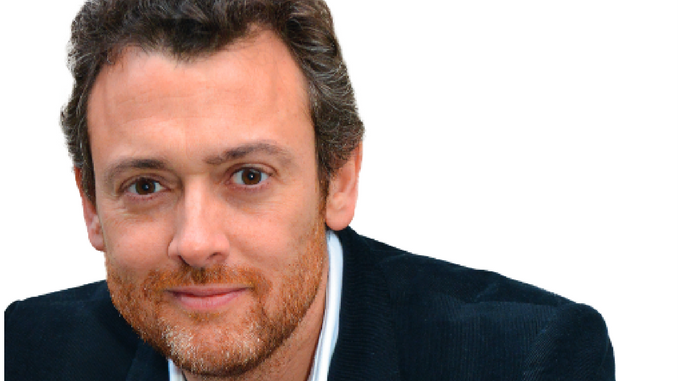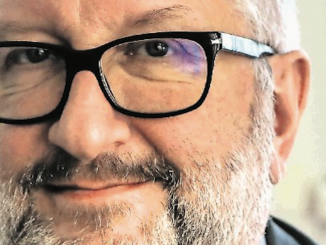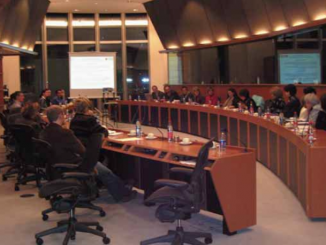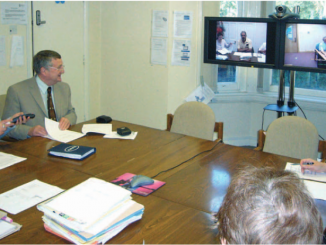
Cancer policy is determined by opinions not evidence, with the loudest voice setting the agenda. This is the worry of Richard Sullivan, who is on a mission to open the discussion to voices beyond the comfortable little world of oncology, and allow new evidence and intelligence in.
Richard Sullivan would like you to ask yourself a question: is what you’re doing justified by evidence? Not just you, but everyone in the cancer community, everyone treating patients, everyone developing protocols, guidelines and policy. When you go back to hard data about what benefits people most, are you sure that the things that you do, the assumptions that you make, are built on firm enough foundations?
His demand for a deeply rational approach might make more sense to you when you know that he is the man who led the recent Lancet Oncology commission on cancer costs in high-income countries and identified a “culture of excess” in cancer which demanded a radical shift in policy. His controversial report, published in September 2011, concluded that cancer professionals and industry should “take responsibility and not accept a substandard evidence base and an ethos of very small benefit at whatever cost.” Specifically, he and his co-authors pointed to the growth of new technologies, over-use of expensive cancer drugs with limited impact, lack of health economic studies, lack of suitable clinical research, defensive medical practice, and a lack of evidence-based socio-political debate.
Their report said that, while the number of cancer drugs available in rich countries had risen from 35 in the 1970s to nearly 100 now, few treatments were “clear clinical winners”. It drew flack from cancer patient organisations for criticising the “futile” provision of expensive care to patients during the last weeks of life.
Today, speaking to me in his office in Guy’s Hospital, London, where he is based, the Professor of Cancer Policy and Global Health at the King’s Health Partners Integrated Cancer Centre wants to take his message still further. What really annoys him, he says, and what he really wants to change, is the fact that cancer policy is still led by opinion, not evidence.
“The loudest voice sets the agenda,” he says. “What’s stunning is that as scientists and clinicians, particularly in the academic field, our lives are supposedly dominated by the use of evidence in the way we treat patients and define protocols. And yet we don’t apply the same rigour when it comes to designing systems, creating policy.”
“I see it at every level, whether it be local, national, European or global, and my biggest mission is to provide intelligence to allow people to have a framed debate about what the reality of the world is, rather than what someone’s opinion is.”
Sullivan is a big picture man, restlessly inquiring, with some big opinions of his own. Trained as a surgeon, moving straight into academia and then industry, his perspective was shaped by seven years as clinical director at Cancer Research UK, the world’s largest independent cancer research charity. Add to that the fact that for 18 years he combined his cancer work with membership of the British Army reserves, and that he has an active interest in ancient medicine, Egyptology, rebuilding conflict zones, conservation biology, science communication and medicinal mushrooms, and you’ll get the idea: Sullivan, still only 45, isn’t a man with a fusty, limited perspective.
As the thoughts speedily tumble out during our interview, it becomes increasingly clear that the diversity of his experience with various cancer “tribes” as he calls them is also what sets him apart from any particular establishment. He is a bit of an outsider, with a unique overview, and he wants to use that perspective to bring change.
“If you really want to explain the world, you have to see through different lenses, prisms, walk through different doors,” he says.
So it is not surprising that his main message in the Lancet Oncology report was the need for more debate and open-mindedness. It also makes sense that his message to the medical profession in his Annals of Oncology editorial on global health last October was equally hard-hitting. If cancer is to be controlled in low- to middle-income countries, he said, “then we are all going to need to step outside our comfortable ‘little’ world of oncology to embrace the players (World Bank, IMF, global commodities, trade agreements, etc.) that will really shape future outcomes for patients.”
The problem with the comfortable little world of cancer, he says bluntly, is that the people with the loud voices who make the big decisions aren’t necessarily the best qualified to do so.
“The people with the loud voices who make the big decisions aren’t necessarily the best qualified to do so”
“Senior people are expected to have insight and opinions on a whole range of public policy issues in which they may never have been trained. They have gained their seniority in relatively narrow areas of clinical medicine or science and are suddenly asked and expected to make public policy, strategy, and political decisions about issues that they have little experience or training in.”
Debate around affordability of cancer care has also become stifled, says Sullivan, because funders, governments, industry and other parts of the cancer community have become more closely bound together, making it harder for people to stand outside and criticise.
“We need to challenge policy in cancer that masquerades as public health when it’s really being utilised to leverage commercial advantage,” he says.
It’s Sullivan’s job to provoke debate. King’s Health Partners Integrated Cancer Centre is an academic health sciences centre, bringing together the expertise of leading London hospitals. Established in 2008, its aim is to create a centre where world-class research, teaching and clinical practice are brought together for the benefit of patients in South East London and beyond. It is a designated centre for the EORTC Network of Core Institutions, and a Member of the Organisation of European Cancer Institutes (OECI).
Sullivan was brought in at the outset to head up the international activities of the centre and develop an international cancer policy and global health theme encompassing clinical services, research and academic arms. At the same time, with the support of the Veronesi Foundation and the online oncology channel eCancer, he developed a new Institute of Cancer Policy – a think-tank-cum-task-force which aims to understand problems and map out solutions for the global cancer community.
It has a programme of daunting breadth, taking on work from a wide range of funders and strategic partners. It is currently helping develop national research and development systems in Chile, South Africa and India, and was the policy research lead in an EU consortium studying cancer communications (ecancerHub). It has a particular focus on affordable cancer care, public health systems in developing countries, and the special problems of countries made frail by conflict, such as Libya, Afghanistan and Syria.
So when Sullivan talks about the work “we” are doing, he’s referring not to himself, but to a wide range of experts and partners, mainly drawn from the staff at King’s Health Partners, and from disciplines as wide ranging as economics, social science, politics, psychology, global health, anthropology, conflict resolution and communication. Sullivan believes that to solve the problems with cancer you have to look to disciplines outside cancer. The cancer world by itself simply doesn’t have the knowhow to put global cancer policy and resourcing issues straight.
It’s what he calls “democratising” cancer policy, to allow new evidence and intelligence in.
Nowhere is this more true than in the field of finding solutions for the growing burden of cancer in low- to middle-income countries.
His Annals of Oncology editorial last year pointed out that cancer had been off the global health menu until the United Nations held a high-level meeting on non-communicable diseases in September 2011. Though 70% of cancer deaths are in low- to middle-income countries, just 4% of global research and development knowledge is applicable to these settings.
“If you think of the amount of money in national research funds in high-income countries, and how much of that money goes into real global cancer, it’s a percentage of a per cent. It’s embarrassing. I stood up at UICC last year and said this.”
But supplying exciting, expensive, hard-to-maintain innovations and technologies is not the answer.
“I used to believe passionately in technology leapfrogging for the good of global health,” he says. “Now we’ve done a lot of research in low-income countries, I’ve completely changed my mind. We have almost nothing to teach them. In fact, if anything, it’s the other way round. I’ve seen approaches, pathways, innovations coming out of South Africa and particularly India – places like the Tata Memorial Centre in Mumbai – which frankly all care teams in high-income countries should see.”
“There is still a tendency for some parts of the cancer community in high-income countries to act in an imperialist way. They say: ‘We’re going to have a big meeting and then we’re going to set down guidelines for the treatment of x in low income countries,’ with little understanding of the country in question. This annoys me so much. Most people who develop cancer will do so in countries with a health trajectory that is completely different from that of high-income countries. This is cancer within the context of a double, triple, quadruple disease burden. But many of the solutions that work seem to get little visibility.”
They are often the simplest things: improving systems, organisation, or the availability of very basic treatments.
Twinning arrangements can have a massive impact. Sullivan cites the example of a partnership between Indiana University and Eldoret in West Kenya, which over the last decade has built impressive cancer services and bicultural understanding. Twinning arrangements by World Child Cancer, a charity that has been facilitating and funding international hospital twinning partnerships since 2007, have brought huge advances for children with cancer in emerging and low-income countries, he says.
“It comes down to real partnership. Spending time there to understand culture and what the real problems are, building relationships, having the money available at the back but not just handing it out, making things sustainable, having an exit strategy.” Helping countries develop solutions rather than importing them wholesale takes time, money and support from institutions and organisations – but once achieved, they can serve as a model for other countries to follow.
Sullivan and his team are now working on long-term plans for sustainable cancer service development in countries such as Sierra Leone through the King’s Global Health Centre. He took colleagues from King’s to spend time in Chile (where he is Visiting Professor in Cancer and Public Health at the Universidad Catolica) to help the country establish research management and planning policies and structures. “I’m hoping this could also act as a template for other Latin American countries.”
Sullivan’s passion for global health – indeed his occupational restlessness – might be explained by his itinerant background. An only child, he was born in Aden in Yemen, his parents employed in the British diplomatic service and oil industry. Their postings took him rapidly across the Middle East and East Africa – “It was very formative to have exposure to so many cultures and environments so soon” – and then, when he was 12, back to the UK. Having adjusted to the cold, it was British prep school and a boarding school in Hampshire, which became “like a new family”. He loved the sport, the outdoor life, the cadet force, and learned how to be self-sufficient.
Inspired by the books of James Herriot, he decided he wanted to be a vet. “But my grades weren’t good enough, so I went into medicine instead, which wasn’t as demanding!” In 1987, he went to St Mary’s Hospital Medical School in London, and realised he had made the right decision – he loved lab work, experimental pathology (in which he gained his BSc degree) and most of all working with clever, dynamic people. He admits to finding the rotations during his surgical training “unimaginably dull”, and he kept his mind occupied by writing “weird articles” about ancient medicine and the hazards of reproduction in space.
He also had another source of stimulation. During medical school he had joined the army medical corps “while slightly bored”, but soon moved into the intelligence group of the British army reserves. Ever since, until 2005, his part-time army activities provided him with a counterpoint to the medical world. They took him all over the world, gave him an expertise in biological weapons that put him on a NATO working group, and primed his abiding interest in the public health issues of countries recovering from conflict (Libya, Syria and Kosovo in particular). He is appalled at how little research has been done on the policies for post-conflict reconstruction, and is today part of the team from King’s building a conflict and health focus.
After qualifying as a surgeon, he completed his doctoral research into the regulation of the cytoskeleton and exocytosis by G-proteins at University College London (simultaneously studying the adaptation of mammals to iodine-depleted environments with colleagues from the University of Chile) under the supervision of cell biologists Bastien Gomperts, Anna Koffer and Alan Hall – “brilliant people, who took no prisoners and taught me the fundamentals of molecular biology.”
Then, in 1999, he boldly stepped out of vibrant academia into industry, joining the clinical research and medical affairs divisions at Merck KGaA. Why?
“I wanted a taster,” he says. “There’s no substitute for being on the inside to give you an idea of how pharma thinks, the models, problems and who makes the decisions.” As the company developed its cancer portfolio including medicines like cetuximab, it also nurtured Sullivan’s interest in cancer. One year later, the insights into drug development became valuable when he began his seven-year stint as clinical director at Cancer Research UK (CRUK), which supports hundreds of clinical trials into new drugs and treatments.
Sullivan was part of the team that developed the organisational framework for the UK’s Experimental Cancer Medicine Centres initiative and led the development of the CRUK Cancer Centre initiative. He became the organisation’s main contact point with the media, providing expertise on a range of clinical and policy subjects – which has left him with an enduring interest in communication issues. He admits to having been intolerant of press distortion and oversimplification, until he came to understand how they too were often manipulated by the publicity machines of organisations.
Working at CRUK was, he says, “like fast-forwarding two or three lifetimes in seven years” – he could push on innumerable doors to find out the true story about every aspect of cancer research, policy and practice, and see the world through the eyes of patients, clinicians, academics, researchers, funders, industry and policy makers alike. “I can’t think of any aspect of science I wasn’t exposed to,” he says.
But alongside the passion, he also began to see some of the “darker side” of human nature and the limitations of “big cancer”. There were some things that could be better said and done outside the restrictions of the establishment. “It was time to walk across the mountain range and find another tribe,” says Sullivan.
He also began to see some of the ‘darker side’ of human nature and the limitations of ‘big cancer’
The tribe called academia has given him the freedom to speak his mind. Now he can talk openly about the great irrationalities and inequalities that annoy him. Foremost is the way that research and funding is vastly, and irrationally, skewed towards cancer drugs, as opposed to other interventions such as surgery and radiotherapy.
“Every piece of quantitative data you look at – whether it be media articles, bibliometrics, expenditure on R&D – will indicate that medicines dominate the socio-political and cultural space. When I present this data, and show people that funders are now spending nearly 80% of their money on basic biological research and drug development, and then show them research done by an Australian group which shows the public health benefit of all cancer drugs compared to other primary modalities is just 20%, absolute maximum – then everyone starts shuffling their feet.”
“But everyone gets excited about drugs because they’re where the big science is, and the research funding too. There are 624 new molecular entities currently in phase I to III trials in high income countries. This is an unbelievable number. They may bring some benefit to some people, but as a population or public health measure, they are not where the action is.”
“They may bring some benefit to some people, but as a population measure they are not where the action is”
But surely there’s a problem with his strictly rational population-based approach to policy, I suggest. Doesn’t it continually run up against the clinician’s fundamental aim to improve life expectancy and quality for each individual patient? And at a time when the emphasis in the clinic is increasingly on personalisation rather than one-size-fits-all approaches, is it surprising that some in the cancer community find it hard to engage with those who tell them they should stop treatments which still offer hope to individuals?
“But you need an open debate about what the trade-offs are and where we really stand,” says Sullivan. “The numbers aren’t out there, so people can’t make these decisions in the first place. You can’t talk about the cost of something without knowing about the losses.”
“I absolutely agree with you that in high-income countries there is a growing and serious divergence between society and individualism. But we’ve found out that, even with the rise of individualism, people are still very socially minded. The public are quite prepared to debate these things. We just assume that adding more and more for smaller and smaller benefit is what they want, and that the doctor–patient interaction can’t be done on a rational basis, but the truth is that it can. So if multiple lines of therapy are being provided towards the end of life with little benefit, we need to stand back, examine these systems and ask: why are we doing this?”
Answering these questions is as much about looking at sociology and culture – how people interact, what sorts of systems engage people – as high-level cancer policy. So Sullivan is increasingly working with social scientists at King’s, looking at social hierarchies, how patients can be better engaged in policies, and the practical realities of making policy relevant for individuals as well as populations.
It’s another example of the way that Sullivan actively seeks out the challenging. Does his questing mind ever manage to go into neutral? His 10-year-old daughter Alice is one diversion. So are skiing and horse riding. But what really provides a therapeutic mental shut-down is another legacy of his army activities: skydiving. He engages in parachute training with the army, and regularly performs HALO (high-altitude low-opening) jumps from 30,000 feet with full oxygen. “You get two and a half minutes of freefall. It’s bloody cold. But it’s a complete mental break. It shuts down everything apart from what you are doing, so it’s hyper-relaxing!”
Richard Sullivan, then, is not your average health academic. Somehow you feel that the cancer world might benefit from a few more generalist, tribe-swapping, evidence-driven, combat-ready sky-diving professors. But maybe, given the difficult questions he is asking, one is enough to be getting on with.






Leave a Reply